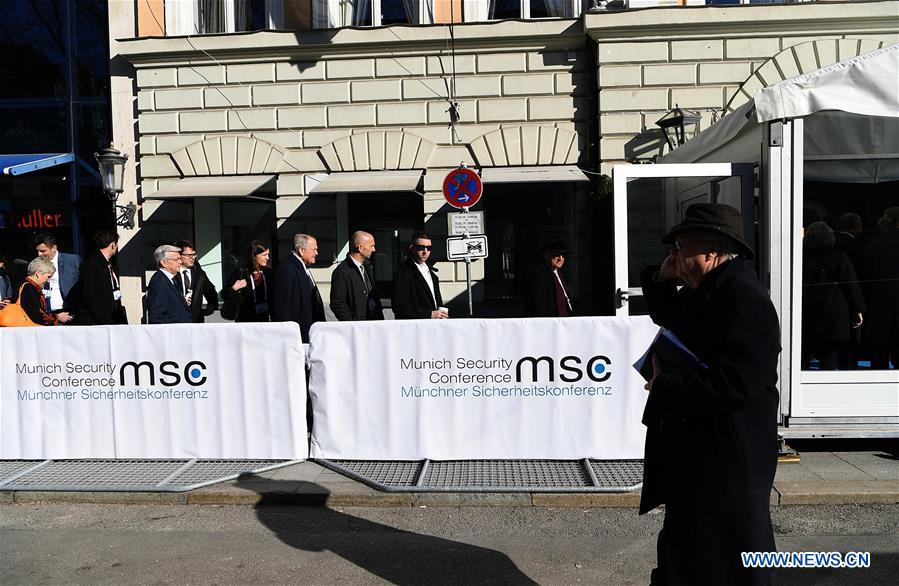


The 55th Munich Security Conference (MSC) kicked off on Friday, focusing on global order reshuffle.
"The world now is not only experiencing a series of smaller and bigger crises. We are experiencing an epochal shift ... an era is ending, and the rough outlines of a new political age are only beginning to emerge," MSC Chairman Wolfgang Ischinger said.
The annual Munich Security Report, which provides guidelines for the talks, said that a new era of great power competition might be unfolding.
"It's not enough to just sit and watch while institutions built over decades are eroding," Ischinger said. He called on participants to build trust in each other during the conference, encouraging people to "talk to each other" rather than "talk about each other."
In his opening speech, Ischinger, dressed in a hoodie with the EU logo, said that the EU's self-assertion will be one of the most important issues to address.
Echoing Ischinger's remark, British Defense Secretary Gavin Williamson said the UK will remain committed to Europe's security after Brexit.
"Our commitment to European security remains steadfast," he said. "We will continue to deliver it long after we leave the EU."
The conference, scheduled from Friday to Sunday, has attracted heads of state and government and other prestigious figures in world politics and security. The event will cover issues including competition and cooperation between the great powers, the EU's future, and the already tainted transatlantic relations.
The Munich Security Conference was first held in 1963. Its original aim was to shore up commitments and help coordinate western defense policies. It has since grown to involve representatives from around the world and has served as a platform for debates on global security issues.
Host country Germany sees the conference as an opportunity to demonstrate its own commitment to international cooperation.
German Foreign Minister Heiko Maas said that "national self-determination is only possible against the backdrop of international coordination."
"I will therefore campaign for doubling down on our commitment to the international order," Maas said.
German Defense Minister Ursula von der Leyen said that we live in a time when "partners matter", and no nation can successfully face the complicated threats alone.
"We need and search for cooperation; we are all doing this," von der Leyen said.
 Fire brigade in Shanghai holds group wedding
Fire brigade in Shanghai holds group wedding Tourists enjoy ice sculptures in Datan Town, north China
Tourists enjoy ice sculptures in Datan Town, north China Sunset scenery of Dayan Pagoda in Xi'an
Sunset scenery of Dayan Pagoda in Xi'an Tourists have fun at scenic spot in Nanlong Town, NW China
Tourists have fun at scenic spot in Nanlong Town, NW China Harbin attracts tourists by making best use of ice in winter
Harbin attracts tourists by making best use of ice in winter In pics: FIS Alpine Ski Women's World Cup Slalom
In pics: FIS Alpine Ski Women's World Cup Slalom Black-necked cranes rest at reservoir in Lhunzhub County, Lhasa
Black-necked cranes rest at reservoir in Lhunzhub County, Lhasa China's FAST telescope will be available to foreign scientists in April
China's FAST telescope will be available to foreign scientists in April "She power" plays indispensable role in poverty alleviation
"She power" plays indispensable role in poverty alleviation Top 10 world news events of People's Daily in 2020
Top 10 world news events of People's Daily in 2020 Top 10 China news events of People's Daily in 2020
Top 10 China news events of People's Daily in 2020 Top 10 media buzzwords of 2020
Top 10 media buzzwords of 2020 Year-ender:10 major tourism stories of 2020
Year-ender:10 major tourism stories of 2020 No interference in Venezuelan issues
No interference in Venezuelan issues
 Biz prepares for trade spat
Biz prepares for trade spat
 Broadcasting Continent
Broadcasting Continent Australia wins Chinese CEOs as US loses
Australia wins Chinese CEOs as US loses